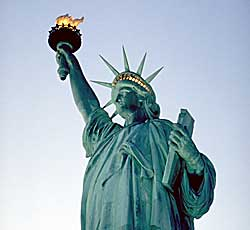 |
LITR 5731 Seminar in
Multicultural Literature American Immigrant Literature |
 |
| Kristin Hamon 21 June 2012 visit to LITR 5731 summer seminar Discussion of "El Patron" |
 Pancho Villa, 1878-1923 |
*****Senior Martinez, Tito, Emiliano, and Lola all
occupy different
places on the land bridge.
*****One of the most
important references to the metaphor of the land bridge is that of Senior
Martinez’s crossing, of which Tito is unaware.
Why hasn’t Tito
been told of this crossing and land bridge experience?
·
226
“Papa, how old were you when you left Mexico for the U.S.?”
·
226 “He disowned you, didn’t he? Grandpa disowned you.
Called you a
traitor to your own country. A deserter when things got tough.”
·
226 “He sighed. The look on his face showed that
sometimes memories
were best forgotten.”
How does Lola use the concept of the
land bridge in order to
bring understanding to a fragile relationship?
*****Lola exposes a truth that Tito
has not previously known. Senior Martinez’s crossing had been hidden! Tito could
never accurately understand his father because their respective experiences with
the land bridge are rife with very different consequences and emotions.
For Mexican American immigrants and their families,
la frontera supports a delicate
balance between the familiar self of Mexico’s multi-generational families and
the autonomous, unprotected self one must assert in American society.
*****Where
does each character stand on the metaphorical land bridge?
Are any of the characters moving “back and forth” or refusing to do so?
In other
words, is the land bridge serving as a bridge or rather a lookout point?
*****How can the concept of the land bridge be seen through
the different relationships presented in the story? Examples?
***Why
do Tito and
Senior Martinez seem to experience the most conflict
in relationship?
Are they at
opposite ends of
the bridge from one another?
Senior Martinez relates to Mexico and his past as something
that still colors his identity.
Ancestry and tradition are important
to Senior Martinez. Why?
How do they relate to his crossing or the concept of the land bridge?
·
224 “There were tears in his eyes, partly from the pride
he felt in this
tradition of
valor
in war.”
·
223 “My
father fought with Pancho Villa”
·
222 “Not
help Tito,
I thought,
but help
me.”
Why does Senior Martinez assume that
he serves as “El Patron”
for son? Why does he
not
understand Tito’s flagrant “act of rebellion?”
·
223
“I should
have never let him go to college,” Senior
Martinez said. “That’s where he gets such crazy radical ideas. From those rich
college boys whose parents can buy them out of all kinds of trouble.”
·
“Even when [Tito] and old Vicente had quarreled about Tito
going to
college instead of
working full-time,
the old man had grudgingly come around to seeing the wisdom of it.” (suggests
downward assimilation)
·
226 “You’re my only son, and damn it! Sons are
supposed to obey
their fathers!”
Senior
Martinez has used the land bridge to cross over. Should
his identity be
described as public or private (both)? Is
Senior Martinez
fully assimilated or unassimilated in a
cultural sense?
Examples / Explanations?
How does Tito assert his right to
assimilate and take on
characteristics more closely associated with the dominant culture?
·
222
“He just finished his
examinations
at the state university”
(Senior Martinez speaking of Tito)
·
226 “’El Patron, El Papa, and Dios,’ Tito said with a
trace of
bitterness.”
·
227 “I just have to take a stand
along with
thousands of others.”
***Although Lola and Tito
both seem more assimilated than Senior Martinez,
Lola’s relationship
with Senior Martinez is very different. How? Why? How does this relate back to
the concept of crossing or the land bridge (or does it)?
·
221 “When I arrived home,
they were sitting
politely in the living room
talking banalities”
·
222 “Without
so much as a glance at Lola, he said, ‘Why
don’t you
go to the kitchen with the
other women.’”
Lola occasionally fights back in the only way still
respectful to her father. How? When?
·
221 “When
she could no longer stand it, she’d give her
father a blast: ‘You
never talk to me about anything important,
you macho,
chauvinist jumping bean!’ Then it would
escalate to nastiness from there.”
·
224 “There was that nothing white bread that presses
together into a doughy flat mass
instead of the tortillas Papa thrived on…There
were no ordinary vegetables like beans and
potatoes and carrots, but funny wiggly long things…and quivering cubes of what
must have been whale blubber.”
However, Lola is eventually the one who is able to start the healing in the
relationship between father and brother.
What is the
purpose of Lola’s questioning and uncovering of the past? How does she know this
strategy will work (or does she)?
***Are
Lola and
Emiliano’s respective places on the land bridge
more temporary than that of Tito or Senior Martinez? Can (or does) their
relationship as husband and wife
exemplify both
tradition and modernity?
Lola is more bold and assertive in her relationship with her
husband than with her father.
·
224 “’You’d better get that, Emiliano,’ Lola said,
daring me to
refuse by her tone of voice and dagger-throwing
glance.”
·
225 “’You should have
made
him come back with you,’
Lola nagged at me that
night.
·
227 “’Because they aren’t signing women,’ Papa said in
disgust. But from the look on Lola’s face,
I’d pick her over
him in any war.”
***Emiliano
and Tito share an interest and respect for
academia.
·
221 “I
was lecturing to a mid-afternoon summer school
class at Southwestern U.”
·
223 “[Registration for the draft] had been
the
topic all
during summer school at Southwestern U.”
They meet on common assimilated ground by breaking bread
together in the most “American” of ways, while the father remains locked into
tradition.
·
225 “Two blocks later Tito finally climbed into the car
after I bribed him with a
promise of dinner at McDonald’s.”
·
225-226 “Since I had only one late morning lecture, I
would pick up Tito,
feed him a Big Mac or two,
then bring him to the house.
Lola would fix Senior Martinez some nice tortillas and
chili, making up for that abominable dinner of
the night before last.”
***What
do the closing paragraphs suggest regarding the respective
identities and
futures of both father and son?
·
228 “I shook their hands as they boarded the bus, and
watched the
two similar faces, one old, one young, smile sadly
at me though the window as the Greyhound pulled away.”
